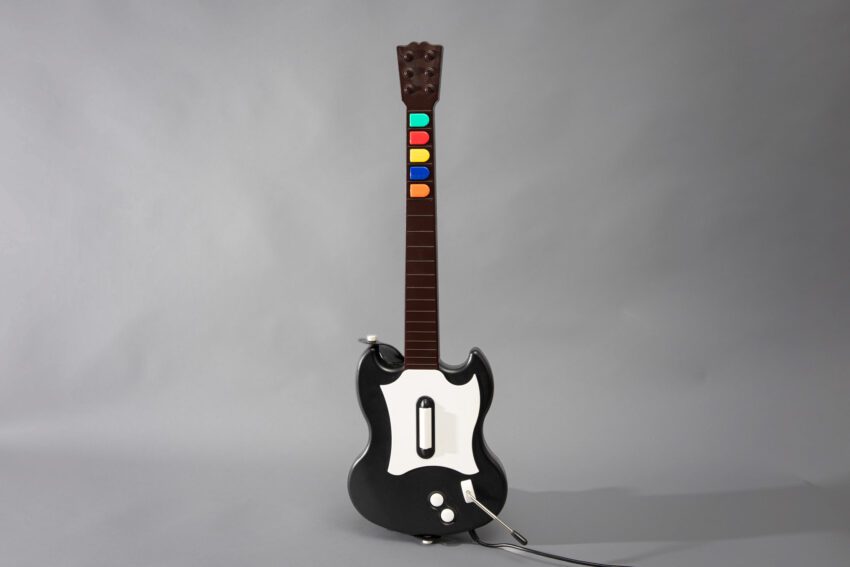
how guitar hero made everybody a rock Guitar Hero transformed the way people interacted with music, turning casual listeners into aspiring rock stars through its innovative gameplay and iconic music selection.
how guitar hero made everybody a rock
The Origins of Guitar Hero
The journey of Guitar Hero began in the early 2000s, a time when rhythm games were gaining traction in arcades, particularly in Japan. The concept was simple yet revolutionary: players could simulate playing a musical instrument using a controller designed to resemble a guitar. This idea was born from the minds at Harmonix, a company that had previously developed the popular game Frequency. They sought to create a game that would allow players to experience the thrill of playing music without requiring any actual musical skill.
In 2005, the first Guitar Hero was released for the PlayStation 2. The game featured a unique guitar-shaped controller with five colored buttons that corresponded to notes on the screen. Players would hit these buttons in time with the music, creating an engaging and immersive experience. The game’s soundtrack was a mix of classic rock anthems and lesser-known tracks, appealing to a wide audience. Songs like “Sharp Dressed Man” by ZZ Top and “Smoke on the Water” by Deep Purple became instant favorites, helping to solidify the game’s popularity.
The Rise of a Cultural Phenomenon
As Guitar Hero gained traction, it quickly evolved from a niche product to a cultural phenomenon. By 2006, the game had sold over a million copies, and its success prompted the release of sequels and spin-offs. Guitar Hero II, released in 2006, expanded the song list and introduced new features, including a multiplayer mode that allowed friends to compete against each other. This addition further solidified its place in living rooms across America.
The impact of Guitar Hero extended beyond just gameplay; it influenced the music industry itself. Getting a song featured on a Guitar Hero setlist became a coveted achievement for artists. The exposure from the game often led to increased sales and renewed interest in older tracks. For instance, bands like Franz Ferdinand and The Killers saw a significant boost in their popularity after their songs were included in the game. The game also introduced players to lesser-known artists, helping to launch new careers and revitalize old ones.
Game Mechanics and Evolution
The core mechanics of Guitar Hero remained consistent throughout its iterations, but each new release introduced enhancements that kept the gameplay fresh. The addition of a “star power” feature allowed players to earn extra points by hitting specific notes in a sequence, adding an extra layer of strategy to the game. Guitar Hero III: Legends of Rock, released in 2007, took this concept further by introducing boss battles against legendary guitarists like Slash from Guns N’ Roses, making the game even more engaging.
Moreover, the introduction of downloadable content (DLC) allowed players to expand their song libraries, ensuring that the game remained relevant long after its initial release. Players could purchase new tracks, including contemporary hits and classic rock songs, keeping the gameplay experience dynamic. This model not only extended the life of the game but also created a new revenue stream for developers.
The Impact on Music and Gaming
Guitar Hero’s influence on both the music and gaming industries cannot be overstated. The game played a significant role in popularizing the rhythm game genre, paving the way for other titles like Rock Band, which allowed players to form entire bands and play multiple instruments. This shift in gaming not only attracted a broader audience but also changed the way music was consumed and appreciated.
For many players, Guitar Hero was their first introduction to playing an instrument. The game provided a sense of accomplishment and satisfaction that encouraged players to explore real-life music. Some even went on to learn how to play the guitar, inspired by their experiences in the game. This phenomenon highlighted the potential for video games to serve as educational tools, bridging the gap between entertainment and skill development.
Community and Competition
The Guitar Hero community flourished, with players sharing tips, tricks, and strategies online. Competitive gaming events began to emerge, with players showcasing their skills in tournaments. The World Series of Video Games held competitions for Guitar Hero, further solidifying its status as a legitimate competitive sport. These events attracted thousands of participants and spectators, demonstrating the game’s widespread appeal.
Online platforms like YouTube also played a crucial role in the game’s popularity. Players began uploading their gameplay videos, showcasing impressive scores and unique play styles. This content not only entertained viewers but also inspired others to improve their skills and engage with the game in new ways. The community aspect of Guitar Hero fostered connections among players, creating a shared experience that transcended geographical boundaries.
The Decline and Legacy of Guitar Hero
Despite its immense popularity, the Guitar Hero franchise began to decline in the early 2010s. The market became saturated with rhythm games, and consumer interest waned. Activision, which acquired the rights to the franchise, attempted to revitalize the series with new releases, but none managed to capture the magic of the original games. By 2011, the franchise was effectively put on hold, leaving fans longing for a return to the glory days.
However, the legacy of Guitar Hero endures. The game not only changed the landscape of music gaming but also left a lasting impact on popular culture. It introduced a generation to classic rock music and inspired countless players to pick up instruments. The game’s unique blend of music and gameplay created a shared experience that resonated with millions, making it a significant part of gaming history.
Modern Resurgence and Future Prospects
In recent years, there have been whispers of a potential revival of the Guitar Hero franchise. With the rise of nostalgia-driven content and the resurgence of interest in rhythm games, many believe that a new installment could find success in today’s gaming landscape. The advancements in technology and gaming platforms could allow for an even more immersive experience, potentially integrating virtual reality or augmented reality elements.
Moreover, the music industry continues to evolve, with new genres and artists emerging regularly. A modern Guitar Hero could tap into this rich musical landscape, introducing players to a diverse array of songs and artists. The potential for collaboration with contemporary musicians could breathe new life into the franchise, appealing to both nostalgic fans and a new generation of players.
Conclusion
Guitar Hero was more than just a game; it was a cultural phenomenon that brought people together through music and gameplay. Its impact on the music industry, gaming community, and popular culture is undeniable. As we look to the future, the possibility of a revival offers hope for fans who wish to relive the excitement of becoming a rock star from the comfort of their living rooms. Whether through a new game or a resurgence of the original series, the spirit of Guitar Hero continues to resonate, reminding us of the joy of music and the thrill of performance.
Source: Original report
Was this helpful?
Last Modified: October 26, 2025 at 8:37 pm
2 views















